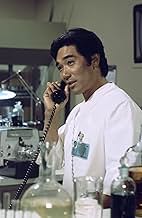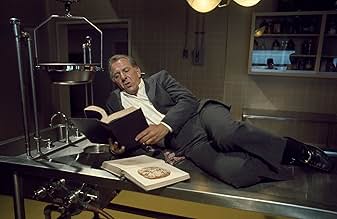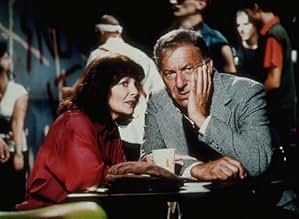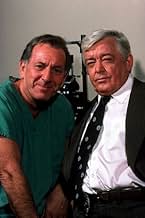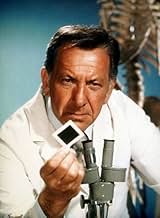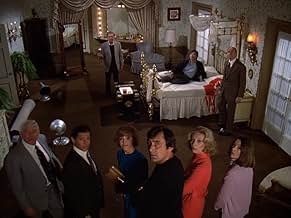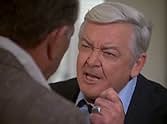The cases of a brilliant, if Irascible, coroner who investigates suspicious deaths which usually suggest murder.The cases of a brilliant, if Irascible, coroner who investigates suspicious deaths which usually suggest murder.The cases of a brilliant, if Irascible, coroner who investigates suspicious deaths which usually suggest murder.
- Nominated for 10 Primetime Emmys
- 2 wins & 13 nominations total
Browse episodes
Featured reviews
So every episode seemed the same? Every episode of I Love Lucy was the same too, and that's a classic. Heck, 90% of TV is the same episode over and over again. This show is great. Before a couple years ago, I wasn't a huge fan of 70s TV, especially dramas, but I'm hooked on this show. The cast is great, the characters delightfully predictable and occasionally over-the-top, and the storylines intriguing. Great stuff. And I got a huge kick out of the fact that Garry Walberg (Lt. Monahan) was also Speed on The Odd Couple. Guess he and Jack followed each other around. LOL
I have enjoyed Quincy for years--both when it first came on TV and in the years following its wide-spread syndication. Despite enjoying the show very much, I must, however, admit that the show was very formulaic and predictable. In 90% of the episodes, they stuck one of two very well-established plot outlines:
1. There is a death and it's assumed that it was by natural causes. In most of these cases, it's actually murder.
2. To Dr. Quincy, the case "just doesn't seem right" and he won't close the case--wanting to take more time with the autopsy or do some investigating on his own.
3. His boss, Dr. Asten, argues with Quincy to just wrap it all up due to either time constraints or pressure from outside sources. In essence, Asten is a bureaucratic weenie and Quincy a crusader for truth.
4. Quincy's friend, Lt. Monahan, wants to close the case because he KNOWS that it either wasn't a murder or he's blaming some innocent guy for the crime. Oddly, despite the Los Angeles Police Department being one of the largest ones in the world, somehow Monahan is almost always on the case--he's apparently a very, very busy guy--as is Quincy!
5. In the end, Quincy is vindicated. Yet, despite this, by the time they do the next episode, they once again begin this same process!
6. They all end up at Danny's and someone says something funny.
OR:
1. A death occurs.
2. Dr. Quincy becomes angry because the death was caused by some social issue such as spousal abuse, sexual abuse or poorly staffed emergency care centers, so he goes on a rampage and annoys practically everyone.
3. Quincy grandstands, makes speeches and preaches not just to the folks in the show but AT the audience.
4. Folks FINALLY listen to Quincy and they all end up at Danny's restaurant. But because it's a social issue program, they may or may not say something funny to end the show.
So why, despite the predictability of the show did I and so many others like it? Well, perhaps it was because although you knew what to expect in general, the shows were very creative in how they thought out the murders. Also, in a few cases, there weren't murders but the show managed to bring up excellent public health issues (though occasionally they were VERY preachy). Plus, over the years, the show evolved into a likable cast. Heck, after a while, you even grew to like Asten--especially since he mellowed and was less of a paper-pushing bureaucrat in later episodes.
Excellent writing, a likable cast and great imagination, this show has stood up well over time.
UPDATE: I just finished re-watching the entire series and think I should update my review. As the show progressed, the quality of the shows began to decline. The decline was slow at first but by season eight, the shows were just awful. I assume they ran out of ideas for crimes to solve, as more and more as the show progressed the shows became soapboxes for social ills NOT shows about forensic science. And, soapbox shows, while perhaps important, are far, far less entertaining.
1. There is a death and it's assumed that it was by natural causes. In most of these cases, it's actually murder.
2. To Dr. Quincy, the case "just doesn't seem right" and he won't close the case--wanting to take more time with the autopsy or do some investigating on his own.
3. His boss, Dr. Asten, argues with Quincy to just wrap it all up due to either time constraints or pressure from outside sources. In essence, Asten is a bureaucratic weenie and Quincy a crusader for truth.
4. Quincy's friend, Lt. Monahan, wants to close the case because he KNOWS that it either wasn't a murder or he's blaming some innocent guy for the crime. Oddly, despite the Los Angeles Police Department being one of the largest ones in the world, somehow Monahan is almost always on the case--he's apparently a very, very busy guy--as is Quincy!
5. In the end, Quincy is vindicated. Yet, despite this, by the time they do the next episode, they once again begin this same process!
6. They all end up at Danny's and someone says something funny.
OR:
1. A death occurs.
2. Dr. Quincy becomes angry because the death was caused by some social issue such as spousal abuse, sexual abuse or poorly staffed emergency care centers, so he goes on a rampage and annoys practically everyone.
3. Quincy grandstands, makes speeches and preaches not just to the folks in the show but AT the audience.
4. Folks FINALLY listen to Quincy and they all end up at Danny's restaurant. But because it's a social issue program, they may or may not say something funny to end the show.
So why, despite the predictability of the show did I and so many others like it? Well, perhaps it was because although you knew what to expect in general, the shows were very creative in how they thought out the murders. Also, in a few cases, there weren't murders but the show managed to bring up excellent public health issues (though occasionally they were VERY preachy). Plus, over the years, the show evolved into a likable cast. Heck, after a while, you even grew to like Asten--especially since he mellowed and was less of a paper-pushing bureaucrat in later episodes.
Excellent writing, a likable cast and great imagination, this show has stood up well over time.
UPDATE: I just finished re-watching the entire series and think I should update my review. As the show progressed, the quality of the shows began to decline. The decline was slow at first but by season eight, the shows were just awful. I assume they ran out of ideas for crimes to solve, as more and more as the show progressed the shows became soapboxes for social ills NOT shows about forensic science. And, soapbox shows, while perhaps important, are far, far less entertaining.
I absolutely loved this series about a coroner's experiences, and have tried in recent years to find a TV replacement, all to no avail. Cold Case Files is bearable (but no Quincy) while CSI is both dark & stark and far too graphic. No opportunity is lost to display blood and guts, generally at the expense of character and plot. Why people view this as entertainment befuddles me. Crossing Jordan is yet another dark tale and generally as concerned with Jordan's sex life as with crime investigation.
By contrast, Quincy is very engaging but also optimistic. Yes, Quincy has his 'relationships' with beautiful young women, but they are portrayed light heartedly, with humour and minimal focus. Jack Klugman is brilliant in the role of the smart & tough, kind hearted & principled, grumpy but charismatic coroner. He is always the underdog's champion, indignant at the crimes & cover ups of the wealthy and influential, and not hesitant to ruffle a few feathers. Quincy is always professional but also personally engaged in the victim's plight. Each episode sees him ferreting out some new case of foul play, aided by his faithful Oriental lab cohort, Sam, engagingly played by Robert Ito. The pair enjoy a touching friendship.
The series gave us a glimpse into the forensic techniques and research of that era. (These may have improved during the intervening decades but alas, the TV series portraying them have not.) Also, many issues equally relevant today were explored, including child abuse, fad diets, alcoholism, child pornography, and so forth. Who cares whether aspects of the show are predictable or whether it is particularly realistic? I for one remain a great fan of the series. As I see it, all the forensic dramas of today pale by comparison.
By contrast, Quincy is very engaging but also optimistic. Yes, Quincy has his 'relationships' with beautiful young women, but they are portrayed light heartedly, with humour and minimal focus. Jack Klugman is brilliant in the role of the smart & tough, kind hearted & principled, grumpy but charismatic coroner. He is always the underdog's champion, indignant at the crimes & cover ups of the wealthy and influential, and not hesitant to ruffle a few feathers. Quincy is always professional but also personally engaged in the victim's plight. Each episode sees him ferreting out some new case of foul play, aided by his faithful Oriental lab cohort, Sam, engagingly played by Robert Ito. The pair enjoy a touching friendship.
The series gave us a glimpse into the forensic techniques and research of that era. (These may have improved during the intervening decades but alas, the TV series portraying them have not.) Also, many issues equally relevant today were explored, including child abuse, fad diets, alcoholism, child pornography, and so forth. Who cares whether aspects of the show are predictable or whether it is particularly realistic? I for one remain a great fan of the series. As I see it, all the forensic dramas of today pale by comparison.
This is the king of formula shows. Every single episode goes down the same way:
Quincy has just gotten off of a particularly grueling case.
The boss brings in a new body that Quincy "just has to look at".
Sam, his ever faithful assistant, is just about to leave for the night before Quincy calls him back. "I need you to stay and figure this one out."
They show the 'late-night working montage', which always consists of Sam running spectral analysis tests while Quincy pokes at the body.
The montage ends, and Sam says "I don't like the looks of this Quince".
Quincy then insults Sam about the quality of his coffee.
Quincy puts on his detective hat, and interviews witnesses.
Quincy will come against opposition to him solving the case, and he will yell at that person. In fact, he will have been yelling for most of the episode, but now the yelling is of a righteous nature.
Quincy will confront his main adversary and scream, "PEOPLE'S LIVES ARE AT STAKE HERE!!"
Quincy's boss, who was against all meddling from the start, eventually comes around.
Quincy solves the case, then explains everything over breakfast/lunch/dinner with his pals.
Someone at the table tells a throw-away joke, usually at Quincy's expense, leaving everyone in stitches.
Roll credits.
Eat your heart out, Jordan Cavanaugh
Quincy has just gotten off of a particularly grueling case.
The boss brings in a new body that Quincy "just has to look at".
Sam, his ever faithful assistant, is just about to leave for the night before Quincy calls him back. "I need you to stay and figure this one out."
They show the 'late-night working montage', which always consists of Sam running spectral analysis tests while Quincy pokes at the body.
The montage ends, and Sam says "I don't like the looks of this Quince".
Quincy then insults Sam about the quality of his coffee.
Quincy puts on his detective hat, and interviews witnesses.
Quincy will come against opposition to him solving the case, and he will yell at that person. In fact, he will have been yelling for most of the episode, but now the yelling is of a righteous nature.
Quincy will confront his main adversary and scream, "PEOPLE'S LIVES ARE AT STAKE HERE!!"
Quincy's boss, who was against all meddling from the start, eventually comes around.
Quincy solves the case, then explains everything over breakfast/lunch/dinner with his pals.
Someone at the table tells a throw-away joke, usually at Quincy's expense, leaving everyone in stitches.
Roll credits.
Eat your heart out, Jordan Cavanaugh
..."Thank God!" some people might think, well, not me. "Quincy" is one of my favourite shows of this kind (second only to the excellent "Columbo"). Jack Klugman is unforgettable as the intense and often angry Dr Quincy and is brilliantly supported by Robert Ito as the idealistic Sam, John S. Ragin as the by-the-book Dr Astin and Garry Walberg as Lt Monahan. Occasionally hammy but always enjoyable.
Did you know
- TriviaQuincy's first name was never revealed during the series. However, in one episode, one of his business cards was briefly seen and read "Dr. R. Quincy."
- GoofsIn the typical opening title sequence, near the end of the credits, there is a scene showing Quincy walking along talking his friend on the beach with people (extras) throwing a football in the background. As the ball is thrown toward the camera it passes off the screen to the left. Moments later a woman with a pink top and blue skirt stumbles into frame grasping her face and eyes. Her companions rush to her aid as she tries to brush sand or grit from her face. She is in obvious distress as is see by everyone's actions toward her, all except Quincy who obliviously walks on toward the camera continuing the scene. This was kept in the opening credits which is odd given that it is made up of snippets.
- Alternate versionsMany of the episodes that aired as part of the "NBC Mystery Movie" were edited down from 88 minutes in length to roughly 44 minutes in length when the show went into reruns in syndication.
- ConnectionsEdited into The NBC Mystery Movie (1971)
- How many seasons does Quincy, M.E. have?Powered by Alexa
- Is there another Quincy F.A.Q. available for this television series?
Details
- Runtime1 hour
- Sound mix
- Aspect ratio
- 1.33 : 1
Contribute to this page
Suggest an edit or add missing content




